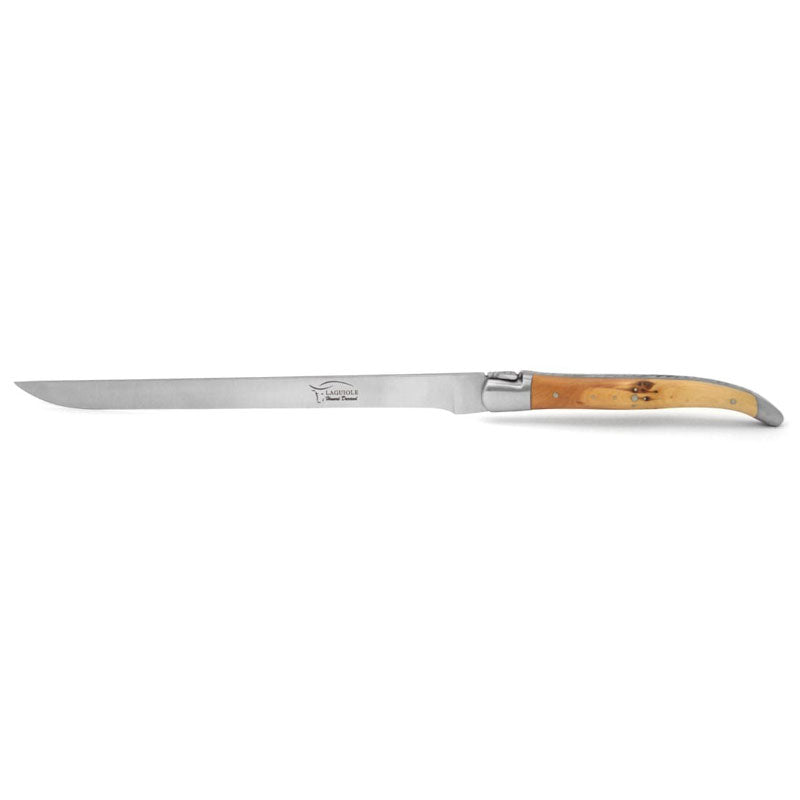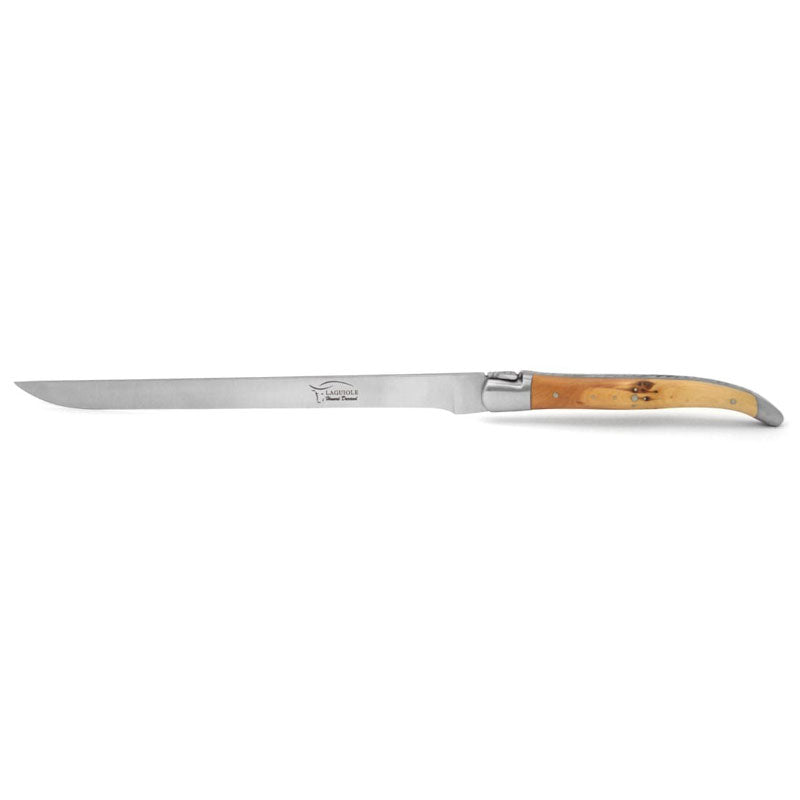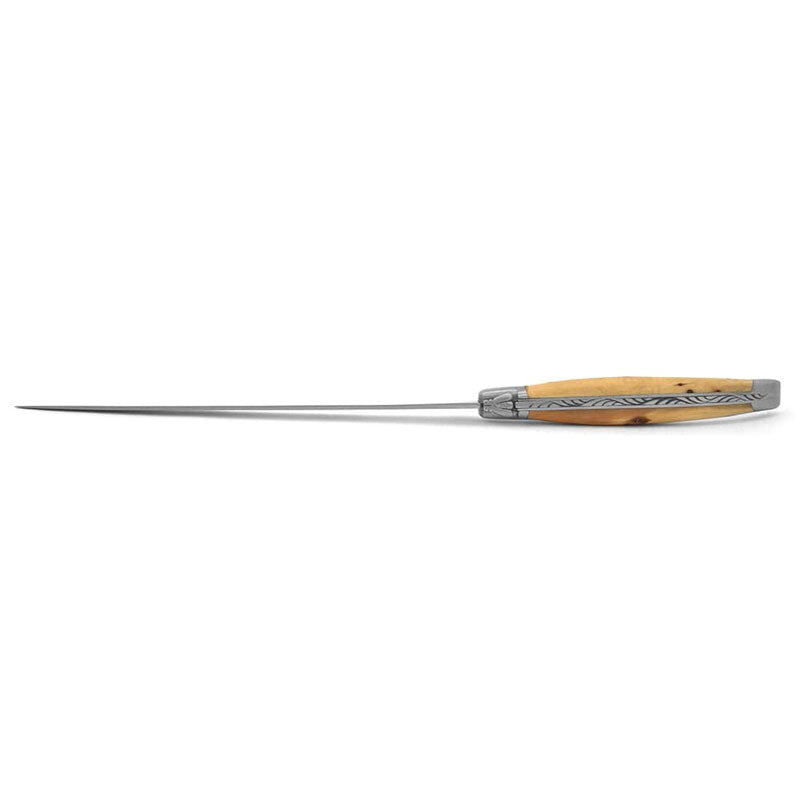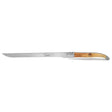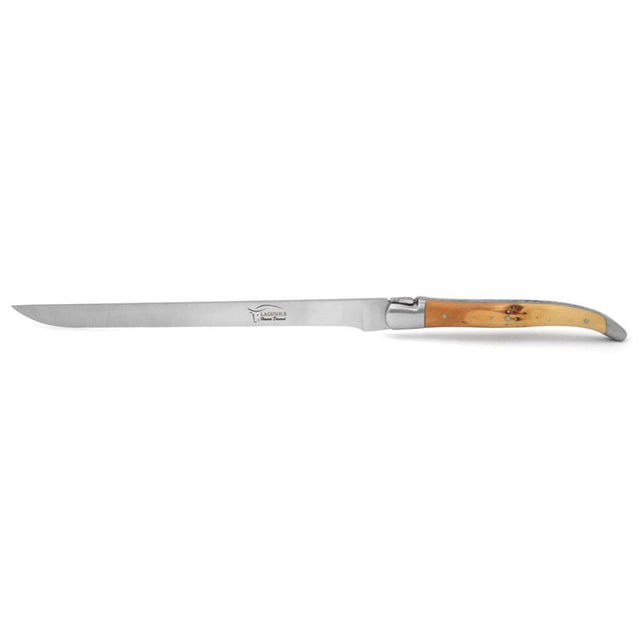Laguiole Foie Gras Knife, Juniper
Crafted with precision in the style of classic French knives, the Laguiole Foie Gras Knife is the perfect addition to your culinary arsenal. The wooden handle adds a smooth texture and luxurious finish while its serrated edge ensures neat carving. Enjoy a refined dining experience with this timeless classic
- Authenticity, refinement and excellence, the Laguiole has become an international cult object of high design significance synonymous with the art of living well
- Each piece with its distinctive bee symbol and carved metal decoration is handmade from start to finish by one master craftsman: one man, one product
- The quality of the finish, the strength of the spring, the thickness of the bolsters and plates, as well as the accuracy of the calibration are the elements that contribute to its longevity
- Finish and length of Handle: Juniper, 12 cm
- Bolsters: Bolsters: 2 Matt or 2 Polished Stainless Steel Bolsters
- Blade: Stainless Steel
- Size: Wooden Box with 1 Piece
- Delivered with a Certificate of Authenticity and Guarantee
- Care: Clean the blade with a damp sponge and dishwashing liquid, then wipe and store. The knife must not be soaked in water or put under the tap
- Made in the village of Laguiole, France
Laguiole Care Information
Laguiole Care Information
A genuine Laguiole knife made in the ancestral fashion is an every day companion
Under normal use your knife has a lifetime guarantee
Handle Care
A folding knife should be wiped, never washed !
- Horntip, Horn, Stag Horn and Ivory Handles:
Horn is composed of keratin similar to feathers and finger nails. This is one of the reasons why it offers a great variety of colours and that this material requires minimum care.
- French Wood or Exotic Wood Handles:
Wooden handles can withstand cold limited water. Nevertheless they still have to be considered as fragile materials.
If your knife handle becomes dry or/and dull, apply olive oil with a soft cloth on it
- Stainless Steel, Carbon Fiber, Aluminium and Acrylic Handles:
These materials are hardwearing and thus recommended for people who need a "rough and ready" outdoor knife or whose hobby is fishing for example.They are more resistant to water and to getting wet than the aforementioned natural handled knifes.
In any case, they have to be wipped after use and the mechanism needs to be cared of.
We strongly advise against using the dishwasher to clean any folding knives.
Blade Care
- Stainless Steel Blade:
Contrary to the traditional blade which blackens, stainless steel blades remain clean whatever use you make of them.
12C27 or 14C28N stainless steel are up-market steels. It is easy to grind whether by professionals or by private individuals.
After use wipe the blade with a damp cloth and dry it. Avoid using scotch brite, it can scratch the blade.
- Damascus Blade:
In case of regular use, wash it after every use to keep its moiré look. If you do not use your knife for a long time, grease your blade to avoid any deterioration in its beauty. A neutral grease such as the silicon grease used in plumbing is preferable.
Damascus blade care is identical to the other blades. In order to clean it, wipe the blade with a wet cloth and dry it. Avoid using scotch brite, it can scratch the blade.
Blade Sharpening
There are 2 different complementary methods for sharpening your knife:
- honing to restore the edge
- grinding to maintain the edge
During both operation you need to keep a 20-30° angle (a blade must not be scratched!)
Press hard and regularly (faster movements does not improve the quality of the sharpening ; it only increases the risks to cut oneself or scratch/chip the blade!)
These methods can be done in a few minutes but need some practice. Before sharpening your brand new Laguiole knife, try to practice with an old knife.
The honing is done on a whetstone or an electric grindstone (grindstone needs to be perfectly round).
Before use, the whetstone has to be submerged in water for about ten minutes. A coarse-grained stone is used for gardening tools and a medium-grained stone for knives.
Make a movement as if you wished to cut a thin slice out of the stone (keeping the same angle). Do this movement again alternating one side of the blade with the other. Wet the stone regularly during the grinding.
Fixing the stone on a workbench using two clamps (contrary to what is shown on the picture below) will free both hands and make the honing easier.
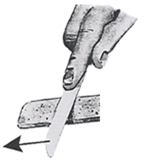
The grinding is made with a magnetized steel with a 25cm long bit and a hilt. Wether it is round, oval or flat, you will do the same movements.The movement is identical to the one with the whetstone. Going from the top of the bit with the bottom of the knife's blade do as if you wished to cut the steel towards the hilt. Do this movement again alternating one size of the blade with the other.
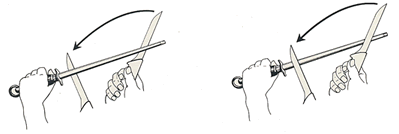
Mechanism Care
It is necessary to oil regularly the moving parts of any folding knife as much as it is for a car engine. It will prevent it from a premature wear.
You can use a multi-use oil or a WD 40 oil. With the blade folded closed, put a drop of oil between the blade and the spring at the blade axle. Open and close the blade, then wipe off the surplus oil.
Bolsters Care
- Solid Brass Bolsters
To leave a Laguiole knife in a leather sheath for an extended period of time without using the knife will oxidize the brass bolsters. This is simply due to the chemical agents used in the tanning process of the leather.
To give the oxidized brass bolsters their original shine, wet a rag with some “ metal polish (Ouator or Miror brands are recommended) and elbow grease will do the rest!
- Stainless Steel Bolsters
No care is needed for knives with stainless steel bolsters.
- For any Knife
Avoid having your knife in your pocket along with other metallic objects such as keys, coins... It might scratch the handle and the metallic parts of your knife
Delivery & Shipping
Delivery & Shipping
Payment & Security
Your payment information is processed securely. We do not store credit card details nor have access to your credit card information.

